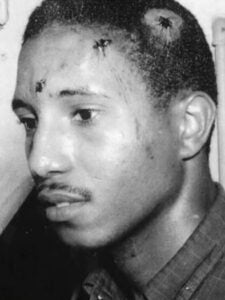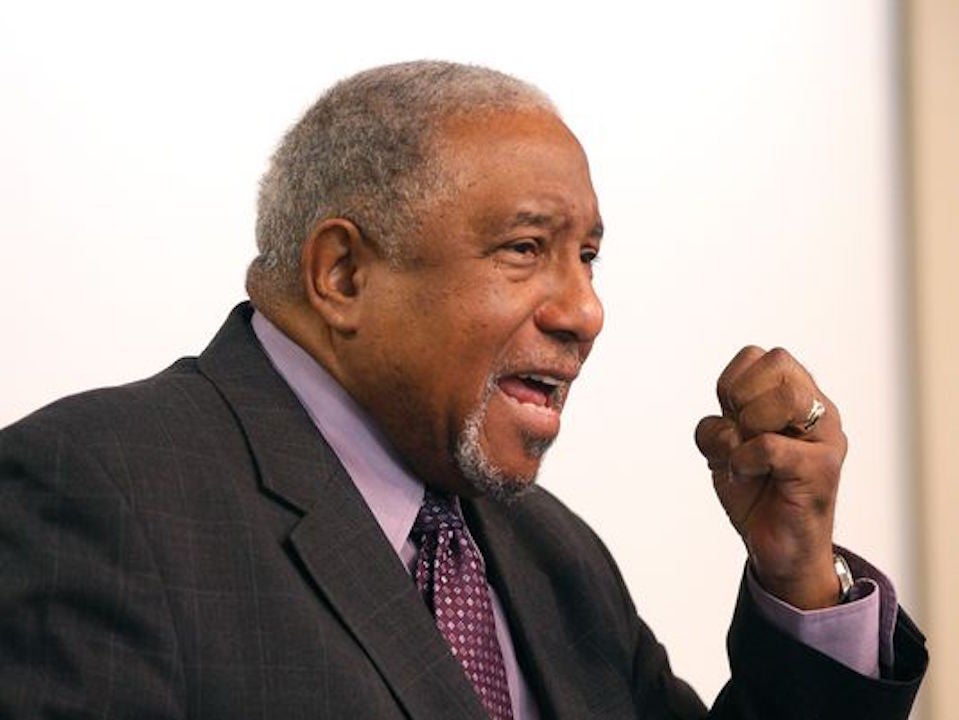KINGSTON, R.I., June 14, 2016—Two obvious ways to prevent atrocities like the Orlando shooting are better gun control laws and mental health policies, says a civil rights activist visiting the University of Rhode Island.
But Bernard Lafayette Jr., also touts the importance of something unfamiliar to most: nonviolence training. A minister, writer and professor who participated in the Selma marches, Lafayette is teaching this week at the annual International Nonviolence Summer Institute on the Kingston campus.
He’s among about 65 people from around the country and world attending the institute, launched years ago by the URI Center for Nonviolence and Peace Studies. Lafayette is the first director of the center.
Participants learn how to resolve conflicts peacefully and work for social change, focusing on the nonviolent methods of Dr. Martin Luther King Jr.
Lafayette says he is “deeply saddened’’ by the shooting by Omar Mateen at a gay club in Orlando early Sunday morning that left 50 people dead and 53 injured.
“The thing that makes it so sad is that these people were targeted for being who they are,’’ says Lafayette. “In his eyes, they weren’t a ‘who’ anymore. They were a ‘what.’ Their humanity was not considered worthwhile, and that’s very sad.’’
He says the first step is trying to figure out what compelled Mateen to commit such horrific violence: “Every act of violence has a history. We have to understand it, so the act is not a mystery.’’

Photo courtesy of Bernard Lafayette Jr.
Authorities should dig deep into Mateen’s past for a motive by interviewing his parents, co-workers and friends. “We have to see how he arrived at that decision. What were his perceptions?’’
Next, the shooting’s impact on young people, especially those who are gay, should be intensely examined. “I don’t want gay people to become entrenched with fear.’’
Then, the country needs to come up with an action plan—with support from the media, he says. “We must not let this fade away after 10 days.’’ He says a powerful way to communicate with young people is through music, and that the artists’ message should be: “Don’t let this tragedy destroy us.’’
He advocates for stronger gun control laws—“You can’t kill anybody unless you have guns,’’ he says—and better mental health policies. Mateen murdered the people with an assault rifle; it’s also been reported that he suffered from mental health issues.
But Lafayette also brings another perspective to the massacre, the worst mass shooting in American history. He says nonviolence training should start as early as pre-school.
“At a very early age, we need to let people know how to deal with differences and conflict,’’ he says. “One of the things we do in our nonviolent teaching is help people recognize others, rather than just themselves. To manage conflict, you have to understand why people feel the way they do. The truth comes from being able to understand both sides.’’
He advocates instilling the values of King that focus on three things: We are different, and that’s O.K. We should learn to “engage’’ people who are different. We must take steps to create a cohesive and beloved community.
“You do not stand idly by when you see a conflict,’’ he says. “You take action.’’
He recalls a training he did with second graders at a school. During a break, a fight broke out on the playground. The second graders gathered around the offenders and started singing the National Anthem.
“They intervened, and the fighting stopped,’’ he says. “This shows how nonviolence training can work. We’ve got to get to people when they’re young.’’
Nonviolence training is crucial to prevent similar horrors, he says. “What’s needed are the skills to help people manage their anger and internal conflict. What most people don’t understand is that anger comes when people feel they do not have the power to make things different. They feel powerless and weak. That’s when they resort to violence.’’
He urges leaders in the gay community, with strong support from the media, to report every incident of violence against someone who is gay, lesbian, bisexual, queer or transgender. “This is the only way,’’ he says, “we’ll bring about change.’’
Lafayette is national chairman of the board for the Southern Christian Leadership Conference and a former distinguished scholar and professor at the Candler School of Theology at Emory University.
He was a Freedom Rider, the former national coordinator of the Poor People’s Campaign, and a close associate of King. He is recognized as an authority on “Kingian’’ nonviolence, lecturing throughout the nation and world on how to prevent violence and respond to violent situations.
The institute ends Friday June 17, with a visit from U.S. Sen. Jack Reed.

